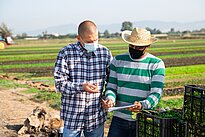Food policy response measures to COVID-19 in Central Asia and Caucasus
02 March 2022 - IAMO researchers Nodir Djanibekov and Thomas Herzfeld look at the impacts of the first waves of the COVID-19 pandemic on agriculture, food security, and rural communities in the countries of Central Asia and Caucasus, and provide options to strengthen the resilience of the agricultural sector during post-COVID-19 recovery and against future shocks.
The progress of the COVID-19 pandemic during 2020 resulted in a contraction of the economies of countries in Central Asia and Caucasus which showed high rates of economic growth in previous years. After the first corona cases, many governments intervened immediately to prevent deaths and overload of the public health system. The lockdown restrictions caused prolonged downtime of the catering and hospitality sector and repeated closures of markets and affected food retail turnover. The disruption in food supply chains as well as panicking and hoarding pushed up the region’s food prices, especially in countries with currency depreciation. The governments’ responses to stabilize food prices did not fully succeed.
As the authors note, despite fears of catastrophic outcomes for agriculture, region’s agricultural production was not affected by the pandemic or the lockdown measures. Instead, it saw a growth in 2020. Agricultural producers could benefit from favourable weather conditions, lower input prices of imported fertilizer and diesel fuel, and the fact that their governments granted a green pass for movements related to agricultural activities during the full lockdowns. The reverse migration caused by the pandemic brought additional hands to agriculture and was among the key factors that made the sector one of the drivers of economic growth. The region’s agrifood trade escaped significant disruptions as food exports recovered quickly after decline at the onset of pandemic.
A prolonged pandemic, however, presents a risk to the development of the region. The global implications, combined with a decline in oil and gas exports and migrant remittances, can disrupt the projected recovery and undermine economic stability. The region needs improved resilience, robustness, and adaptability of its agriculture, food, and rural sector to a similar pandemic or other risks in future. In this regard, the authors recommend avoiding export restrictions, more diversified trade markets, higher value-added food processing, efficient management of food stock reserves, as well as investing in capacities of return migrants and future labour migrants. Finally, future policy response might benefit from enabling high-quality data collection beyond standard production and international trade statistics.









